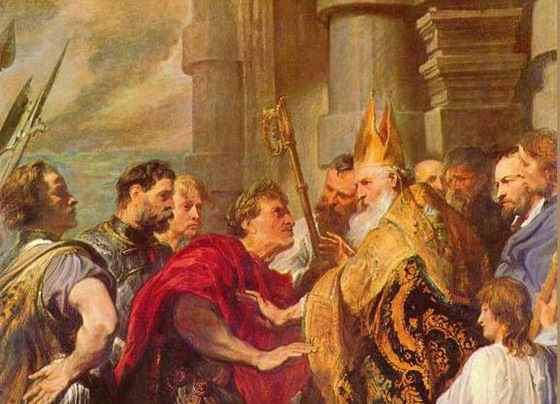Ambrose, Bishop of Milan between 374 and 397, has long been recognized as one of the great early Christian thinkers. He was no ivory tower academic however, and he regularly addressed emperors and others in authority on their public and moral duty. On one occasion, he confronted the Roman Emperor Theodosius who had just ordered a massacre in Thessalonica, in retaliation for an act of insurrection (pictured above). The most probable date for his book, On the Duties of the Clergy, is 391, the year after he rebuked Emperor Theodosius. In an earlier passage from that book, he has been warning pastors against hasty and thoughtless speech. Here, though, he warns pastors that if they fail to speak out, they will have to give an account to God for their silence.
What then? Ought we to be dumb? Certainly not. For: “there is a time to keep silence and a time to speak.”1 If, then, we are to give account for an idle word, let us take care that we do not have to give it also for an idle silence.2
Looking into the coming months, there is no way of knowing how we will be called to speak on behalf of Christ. But as his followers, we can be sure that such moments will indeed come. Let us look to our Savior, the author and finisher of our faith, and appropriate the requisite courage to speak his words into a dying world.
![]()
Footnotes:
![]()
1 Ecclesiastes 3:7
2 Ambrose, "Duties of the Clergy," Some Principal Works of St. Ambrose, in A Select Library of Nicene and Post-Nicene Fathers of the Christian Church, vol. 10 (Oxford,: James Parker and Company, 1896), 2. In other translations see: Book 1, Chapter 3, Section 9.





